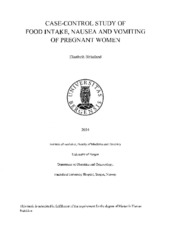Case-control study of food intake, nausea and vomiting of pregnant women
Abstract
Background: Severe pregnancy induced nausea and vomiting, also known as Hyperemesis gravidarum (HG), can lead to significant reduced quality of life (QOL) and of food intake. Untreated this can potentially harm both mother and foetus. An English questionnaire, PUQE, identifies women severely affected with HG. Our aim in present study was to investigate whether scores from a Norwegian translated version of PUQE; SUKK (SvangerskapsUtløst Kvalme Kvantifisering) was associated with severity of nausea and vomiting of pregnancy (NVP) and the nutritional intake of women with HG (cases) compared to a group of healthy pregnant women (controls). Methods: A prospective observational case-control study was conducted in Western-Norway: Bergen, Stavanger and Førde, during May 2013-January 2014. A total of 69 pregnant woman participated; 38 hospitalised patients with hyperemesis gravidarum and 31 healthy pregnant controls. The participants answered the SUKK questionnaire and a question of QOL, in addition to report their nutritional intake over a period of 24-hours. SUKK and QOL scores and food intake were calculated and compared.
